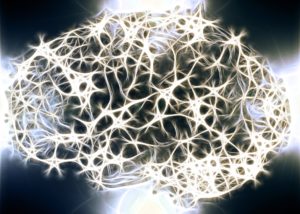
12 May What is happening to my brain?
by Janis Palma, USCCI, NCJIT-S
I can remember how to say “Compass Rose” and “boatswain” in Spanish at the drop of a hat, but I cannot remember what I ate for lunch 2 days ago.
I can recall every word of a 2-minute narrative by a witness and render it fully into English, but I cannot recall what someone said to me (or what I said to someone) a week ago.
Because I am an interpreter!
Well, I am no neuroscientist or neuro-anything, but it doesn’t take much to realize my brain—and, by extension, my memory—does not work like most other people’s brains. Why? Because I am an interpreter. It’s that simple. I have been using my brain in ways that people who are not interpreters will never use theirs.
 Scholarly articles on the bilingual brain are fascinating. In fact, they make me wonder how we can ever do what we do. One such researcher, Narly Golestani, from the Brain and Language Lab at the University of Geneva, has mapped the brain of interpreters during simultaneous renditions using functional magnetic resonance imaging (fMRIs), confirming what most of us already know intuitively: “Simultaneous interpretation is an extremely demanding task that requires exquisite control of the language system in order to comprehend and produce speech concurrently in two different languages.”[1] This, of course, can be said of consecutive interpreting, although the concurrency of the process is somewhat different inasmuch as we must be perceiving or understanding the message in one language, retaining that information while converting it to another language, and within seconds be producing the converted message.
Scholarly articles on the bilingual brain are fascinating. In fact, they make me wonder how we can ever do what we do. One such researcher, Narly Golestani, from the Brain and Language Lab at the University of Geneva, has mapped the brain of interpreters during simultaneous renditions using functional magnetic resonance imaging (fMRIs), confirming what most of us already know intuitively: “Simultaneous interpretation is an extremely demanding task that requires exquisite control of the language system in order to comprehend and produce speech concurrently in two different languages.”[1] This, of course, can be said of consecutive interpreting, although the concurrency of the process is somewhat different inasmuch as we must be perceiving or understanding the message in one language, retaining that information while converting it to another language, and within seconds be producing the converted message.
Beyond language
Golestani told Geoff Watts, a former biomedical researcher-now-journalist, during a visit he made to the Geneva lab: “There’s been a lot of work on bilingualism. Interpretation goes one step beyond that because the two languages are active simultaneously. And not just in one modality, because you have perception and production at the same time. So the brain regions involved go to an extremely high level, beyond language.”[2]
But why do I remember some things so well, and forget others so easily? Well, neurological research has found that we store information in two different parts of the brain. “It appears the hippocampus provides temporary storage for new information whereas other areas [of the brain] may handle long-term memory. Events that we are later able to remember appear to be channeled for more permanent storage in the cortex (the outer layers of the brain responsible for higher functions such as planning and problem-solving.)”[3] Could it be that I have nurtured my brain’s cortex more than my brain’s hippocampus, so I can store all that vocabulary and other linguistic data I need to perform my job as an interpreter?
Rapid and short-lived or slower and long lasting?
Susumu Tonegawa from the RIKEN-MIT Center for Neural Circuit Genetics in Japan has conducted research that “points to the existence of complementary memory systems. One allows rapid memory formation but has limited capacity, and thus needs to pass information that should be retained to another system that is longer-lasting but slower-acting. This frees space in the hippocampus that can then be reused.”[4] And there you have it! My memory’s storage capacity is not unlimited.
 “Psychological studies of human memory make a distinction between Short-Term Memory (STM) and Long-Term Memory (LTM). The idea of short-term memory simply means that you are retaining information for a short period of time without creating the neural mechanisms for later recall. Long-Term Memory occurs when you have created neural pathways for storing ideas and information which can then be recalled weeks, months, or even years later. To create these pathways, you must make a deliberate attempt to encode the information in the way you intend to recall it later. Long-term memory is a learning process. And it is essentially an important part of the interpreter’s acquisition of knowledge, because information stored in LTM may last for minutes to weeks, months, or even an entire life.”[5]
“Psychological studies of human memory make a distinction between Short-Term Memory (STM) and Long-Term Memory (LTM). The idea of short-term memory simply means that you are retaining information for a short period of time without creating the neural mechanisms for later recall. Long-Term Memory occurs when you have created neural pathways for storing ideas and information which can then be recalled weeks, months, or even years later. To create these pathways, you must make a deliberate attempt to encode the information in the way you intend to recall it later. Long-term memory is a learning process. And it is essentially an important part of the interpreter’s acquisition of knowledge, because information stored in LTM may last for minutes to weeks, months, or even an entire life.”[5]
Because we are interpreters!
I always say that if I do not need to remember something in order to do a better job as an interpreter, I won’t. I really don’t need to clutter my brain’s cortex with useless memories, like what I had for lunch 2 days ago. Well, maybe it’s not that simple, but as an interpreter, I know for a fact I need a lot more language-processing information in my long-term memory than people who are not interpreters, so I will purposely let any trivial recollections fade away from the short-term memory in my hippocampus.
So if anything like this is happening to you, don’t worry. We are not absent-minded. We’re interpreters!
[1] Narly Golestani, Barbara Moser-Mercer, Alexis Hervais-Adelman, et al. Brain plasticity in interpreters. http://virtualinstitute.fti.unige.ch/home/index.php?module=clip&type=user&func=display&tid=4&pid=3&title=brain-plasticity-in-interpreters
[2] Geoff Watts. The amazing brains of the real-time interpreters. http://www.bbc.com/future/story/20141117-the-ultimate-multi-taskers
[3] Simon Makin. Where does the brain store long-ago memories? https://www.scientificamerican.com/article/where-does-the-brain-store-long-ago-memories/
[4] Ibid.
[5] Weihe Zhong. Memory Training in Interpreting. http://translationjournal.net/journal/25interpret.htm
Janis Palma has been a federally certified English<>Spanish judiciary interpreter since 1981. She worked as an independent contractor for over 20 years in different states. Her experience includes conference work in the private sector and seminar interpreting for the U.S. State Department. She joined the U.S. District Courts in Puerto Rico as a full-time staff interpreter in April 2002. She has been a consultant for various higher education institutions, professional associations, and government agencies on judiciary interpreting and translating issues. She is a past president of the National Association of Judiciary Interpreters and Translators.
Contact: janis.palma@gmail.com


Janice,
I very much enjoyed your article.
Many blessings,
Vicente
Thank you for that line, Janis. Next time I am accused of forgetting something, I know what to say!
Just kidding. This is very interesting. Thank you!
Nice! I’ll add it to my repertoir of explanations of why I cannot recall names of the people I meet or the birthdays of friends and family! Jokes aside, thank you, Janis, for bringing a scientific look at our brains.
Janis, I thank you for sharing this knowledge, and peace of mind
Hi Janis:
Wonderful post. I have been doing this for twenty years in multiple languages and have occasionally wondered if my brain is finally turning to mush 🙂 Thanks for enlightening us.
Thank you, Janis: a very informative article. I have now an excuse when I call Rubi Tuesday, Tuesday Morning!!
Janis, I am a staff interpreter in New Jersey and I really enjoyed your article. It explained why I work very productively, then go home and can’t remember names of songs or the names of the foods I ordered in a restaurant that day. It’s because my brain reserves its best efforts for work.. You have made me feel better! Thanks, Patti Firth, Staff Interpreter, Somerset County Courthouse, N.J.